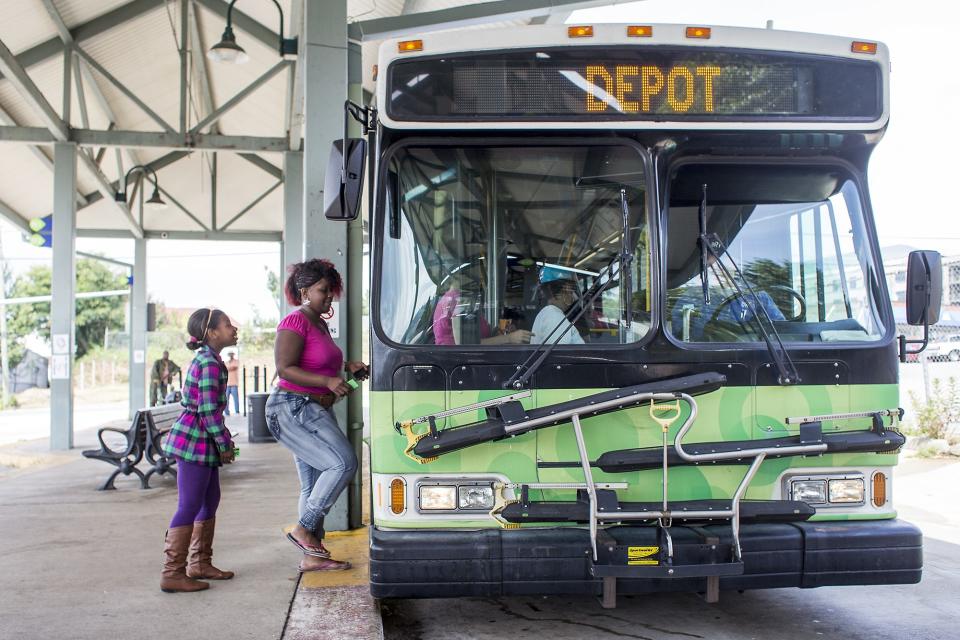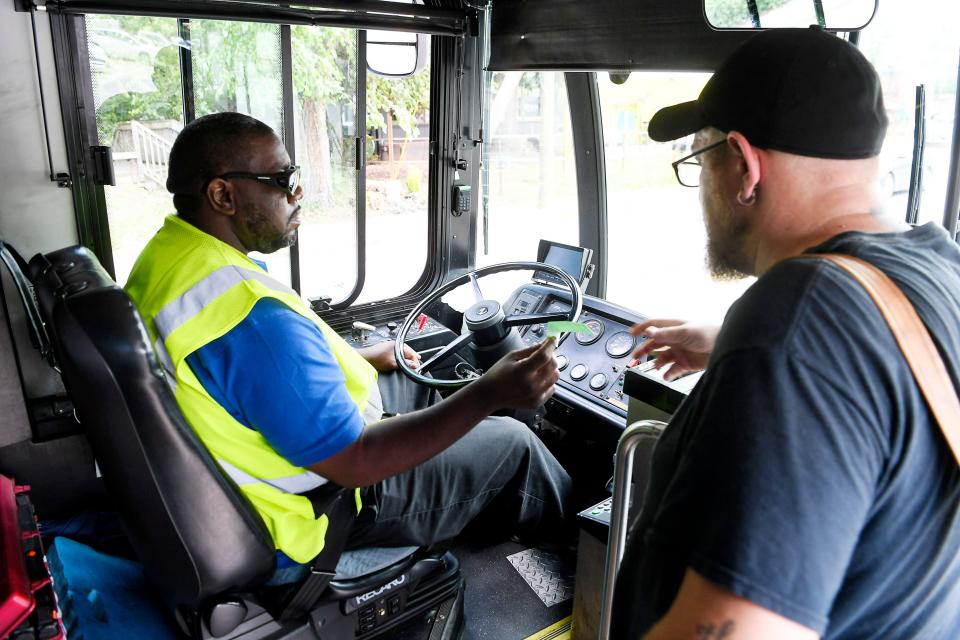Answer Woman: What is going on with Asheville's electric buses?
ASHEVILLE - Today's burning question is about Asheville's electric buses, with even more questions after recently reported numbers in other media caused a stir among some of the city's critics. Got a question for Answer Man or Answer Woman? Email Executive Editor Karen Chávez at KChavez@citizentimes.com and your question could appear in an upcoming column.
Question: I haven’t seen the electric city buses in a while and I heard the city was going back to ordering the traditional diesel buses instead of the cleaner electric and or natural gas vehicles. Is this true?
Answer: Presently, the city is not pursuing the purchase of additional electric buses, the city's transportation department said in late January. In Asheville Rides Transit's fleet of 35 buses, five are electric.
"This decision stems from the need for the electric bus industry to mature and align more closely with Asheville Rides Transit's specific requirements in terms of vehicle range, reliability, size, and cost-effectiveness," city spokesperson Kim Miller said by email.
But OK. What actually happened?
The above reader question actually came before a January article from WLOS that reported the city's 2018 purchase of five electric buses led to a multimillion-dollar loss. They report buses "sitting idle," unable to run because of software and mechanical issues.
Following the report, more questions rolled into the ACT.: If the buses are "lemons," why not return them? And what's the actual story on a Fox Business article, which referred to the situation as a "cautionary tale" and leaned heavily on WLOS reporting?

While there have been issues with the electric buses — in large part due to their manufacturer, California-based Proterra, declaring bankruptcy in summer 2023 — Interim Transportation Director Jessica Morriss said she wouldn't say the city's experience has resulted in a complete loss.
"We still have an asset," Morriss said. "At this moment, three of the five (buses) are out and functioning."
“What I would say is that we have learned a lot and we believe that, as an industry, there is ... a lot of maturing that might need to happen, and also we need to make sure that whatever we are procuring is going to work with our unique situation," Morriss told the Citizen Times Jan. 30.
“I think, overall, the electric bus industry is still viable. And I think that we did the best we could with the information we had, and we used grant funds to try to offset costs and do what we thought was the best for the city at that time and trying to achieve some sustainability goals while also meeting transit needs. In all honesty, I think it’s really more the Proterra specific situation that has made this untenable.”
Three of the five buses were out of service at the time of WLOS's reporting. Now it is two.
Reporting from the Washington Post on the bankruptcy filing called Proterra an "industry pioneer," praised by President Biden, but the company, founded in 2004, found itself "badly shaken" by supply-chain disruptions and inflation.
Phoenix Motorcars, another California-based electric vehicle developer, announced in November it would acquire the Proterra Transit business line from the company.
Asheville's five electric buses were purchased in 2018, including chargers, for $616,796 a pop. They were bought with a combination of Federal Transit Administration grant funds, state grant funds and city dollars.
The purchase was part of the city's environmental strategy, the Citizen Times reported at the time. Collectively the ART electric vehicles were expected to reduce carbon output by 270 tons a year.
Of the total initial purchase cost of $4 million, federal funding covered $2.6 million. State, local and other funding covered the remaining $1.4 million. There were initially plans to purchase three more electric buses by the end of that year, but problems with range and the large size of the vehicles put that program on hold, the Citizen Times reported in September 2019.

How many buses are in the city's fleet?
Since the purchase of the electric buses, the city has added nine biodiesel and five hybrid buses to its fleet, bringing the total to five electric, 12 hybrid and 18 biodiesel for the city's 18 routes.
The fiscal year 2024 budget includes $1.1 million for the purchase of two additional biodiesel buses.
The city has contracted with RATP Dev USA for operations and maintenance of ART since 2017. The eight-year contract, totaling $58.8 million, is set to expire June 2025. As a standard practice, Miller said via email, there will be a re-bidding process for the service.
The RATP Dev contract is overseen by the city's Transportation Department. The adopted fiscal year 2024 budget was $14 million, the bulk of which went toward the contract. This fiscal year, the Transit Services Fund received a little over $3 million in federal state grants and was also subsidized with money from the general and parking funds, a typical practice.
How do costs compare for electric vs. biodiesel or hybrid?
After Proterra filed bankruptcy, difficulty acquiring needed parts and servicing for the electric buses complicated the city's ability to maintain more specialized vehicles, Morriss said. They have been in communication with Proterra in recent weeks, working to address ongoing issues, and recently got one of the buses back on the road.
One of the electric buses has been out of service since July with non-functioning back doors, Morriss said. With much of the tech proprietary, it's not something they can get from anyone else besides Proterra.
She estimated the city has spent $250,000 for parts and labor since the buses got on the road in 2019.
There are also ongoing annual operational expenses beyond maintenance and repair, Miller added. An annual battery lease for the five electric buses is $118,000, or $1,675 monthly per bus. There's $45,481 in annual electricity charges.
It costs about $1.08 per mile to run the electric. Fuel for the non-electric buses 71 cents per mile, Morriss said.
As for the maintenance comparison, on average, the electric buses cost about 48 cents per mile, versus 35 cents per mile for diesel or hybrid.
It's a "nuanced conversation," Morriss said, noting that any city asset will have an upfront cost, maintenance needs and a finite lifetime.
Ridership numbers?
According to numbers provided by the city, in fiscal year 2019, before the pandemic, ART ridership reached nearly 2 million rides annually. But from fiscal year 2020 to 2023, it mirrored a nationwide declining trend, hitting a low of just under 1.4 million rides marking a 30% decrease.
"This decline was primarily due to reduced route frequency resulting from the impacts of COVID-19 and labor shortages," Miller said. "Encouragingly, in FY24, ridership has increased by approximately 20% compared to FY23 year-to-date figures"
During the first six months of fiscal year 2024, ridership reached 766,782 rides, compared to 634,327 rides the year prior.
What next?
Morriss said her department will bring the transit conversation to the Asheville City Council budget retreat Feb. 22-23 in the banquet hall of Harrah's Cherokee Center.
From there, they can discuss future plans for the city's transit operations. Also up for discussion is $300,000 included in the fiscal year 2024 budget for a City-County Transit Master Plan.
More: Asheville, Buncombe annual homeless count draws record number of volunteers
More: Blue Ridge Parkway 2023 visits surged, Great Smokies also had crowds; How many visitors?
Sarah Honosky is the city government reporter for the Asheville Citizen Times, part of the USA TODAY Network. News Tips? Email shonosky@citizentimes.com or message on Twitter at @slhonosky. Please support local, daily journalism with a subscription to the Citizen Times.
This article originally appeared on Asheville Citizen Times: Did Asheville lose millions of dollars on electric buses?

